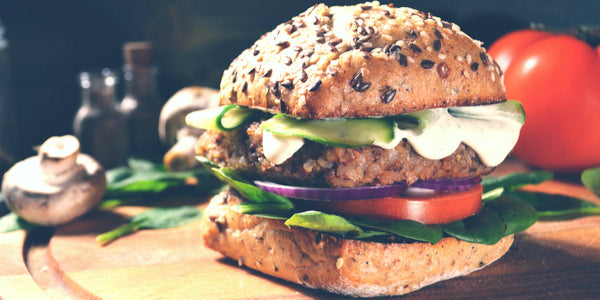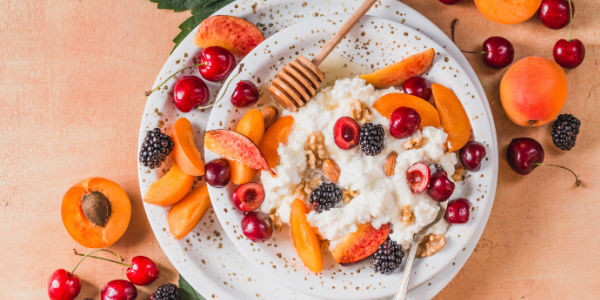
Vegan burgers and meat alternatives have been in mainstream grocery stores for years.
Just recently, however, large fast food companies have adopted fake meats on their menu suggesting a growing increase in demand. In fact, sales of meat alternatives have increased 264 percent just since March 2020!
Two companies, in particular, Beyond Burger® and Impossible™ Foods, produce meat alternatives claiming to look and taste identical to real meat.
Before choosing these meat alternatives, what really is vegan meat and such a popular meatless burger?
What Is a Vegan Diet & Meat?
A vegan diet excludes all animal-based foods, while various vegetarian diets still allow certain animal foods in moderate amounts. For example, a vegan diet contains no meat, seafood, eggs, dairy, or honey while a vegetarian diet may include some of these foods.
That being said, vegan meat is considered any plant food that replaces meat or animal made products in the diet. Common vegan meat substitutes are made from soy products such as tofu, tempeh, seitan, or texturized vegetable protein (TVP).
A combination of legumes, nuts, seeds, and whole grains are also long-standing meat replacements. A variety of these foods provides all the essential amino acids found in animal food.
"Newer" vegan meat alternatives include mushrooms, jackfruit, or mycoproteins made from fermented fungus.
Why Are Vegan Meats Popular?
People cut out animal foods for various reasons, including those related to religion, animal rights, or the environment and economy. One might adopt a vegan diet to improve health, as research links diets rich in processed red meats to many chronic conditions.
Interestingly, while demand for meat alternatives is rapidly increasing, only about five percent of Americans consider themselves vegetarian according to a 2018 poll. The data suggests Americans still eat meat and animal products, though they might be looking for easy ways to reduce meat intake rather than cut out completely.
Swapping a traditional burger for a meatless burger might be one way to do so.
Meatless Burgers
If looking to eat more plants, one might choose a meatless burger over a regular burger. Many meatless burgers can be found in the freezer or refrigerated section of the grocery store. They are often soy protein-based though can also be prepared mainly with veggies or a combination of grains and legumes.
Making homemade black bean or veggie burgers can limit added preservatives or sodium often found in some pre-made meatless burgers. Preparing at home can also be cheaper than buying premade like the Impossible™ Burger or Beyond Burger®.
Impossible™ Burger vs. Beyond Burger®
Impossible™ Foods (maker of Impossible™ Burger) and Beyond Meat (maker of Beyond Burger®) are trying to reach more people with meatless options by offering a meatless burger. But not just any meatless burger… One that looks and tastes like real meat.
According to a June 2019 The New Republic article, Beyond Meat is now sold at more than 35,000 grocery stores nationwide. Impossible™ Burger can be found in more than 7,000 restaurants nationwide.
Both companies are challenging how Americans think about meatless options and looking to fill a "meat void" by providing products that look and taste like meat. They aim to lower use of land, water, and gas emissions while steering clear of animal cruelty issues and health controversies often tied to traditional meat.
Impossible™ Burger
So, what exactly is in an Impossible™ Burger? It has a surprising 22 ingredients, sparking some negative feedback from dietitians and other health professionals.
With this many ingredients, it can be considered a processed or even ultra-processed food. Processed foods are considered foods with parts of many foods lumped together but are not intact, whole foods.
Some nutrients naturally found in foods may be eliminated when processed. A 2019 study concluded eating ultra-processed foods may be associated with overeating and increased risk for obesity.
Impossible™ Burgers are mainly made up of water, soy protein concentrate, coconut oil, sunflower oil, and natural flavors. They also contain lesser-known ingredients like methylcellulose, yeast extract, cultured dextrose, food starch-modified, soy leghemoglobin, and salt.
Beyond Burger®
Like the Impossible™ Burger, the Beyond Burger® has more ingredients than one may think. It has 22 ingredients and mainly consists of pea protein isolate, water, expeller-pressed canola oil, refined coconut oil. It also contains ingredients like cellulose from bamboo, methylcellulose, natural flavors, maltodextrin, and potato starch.
Both companies stress the recipes for their products are constantly evolving and changing. Even though the ingredients for both burgers are known, the exact recipe and production methods are unrevealed.
Are Meatless Burgers Healthy?
Studies have shown the health benefits of replacing red meat with legumes, nuts, and other plant protein sources. Does that mean eating an Impossible™ Burger or Beyond Burger® is the healthier choice?
At this point, more research is needed on these processed plant-based meat alternatives like Impossible™ and Beyond Burgers®. Health benefits from replacing red meat with whole, intact plant foods may not translate the same way with these processed burgers.
Nutrition of Meatless Burgers
When comparing an Impossible™ Burger or Beyond Burger® to a traditional burger, one might assume superior nutrition compared to meat options. However, nutritional values might not be as different as would one guess.
The table below highlights the nutrition differences between the Burger King® Impossible™ Whopper® and regular Whopper®.

Overall, Impossible™ Burger or Beyond Burger® have on average only about 20 to 50 fewer calories than a 4-ounce beef burger. Protein amounts can vary a few grams above or below between these two meatless burgers and a traditional burger.
Both plant-based meat alternatives are lower in cholesterol, total, and saturated fat. However, they are not significantly lower in saturated fat due to the coconut oil used in both plant burgers. These plant-based burgers are higher in sodium and fiber compared to a traditional burger.
What CAN be a clearer healthy, meatless option is a meatless burger that uses intact plant foods like legumes, whole grains, vegetables, nuts, and seeds. If choosing between premade options at the store, look at the ingredient label to see which contains the most real foods or consider making at home.
Remember, whether a real burger or a processed meatless one, eat in moderation and as part of a balanced diet!







